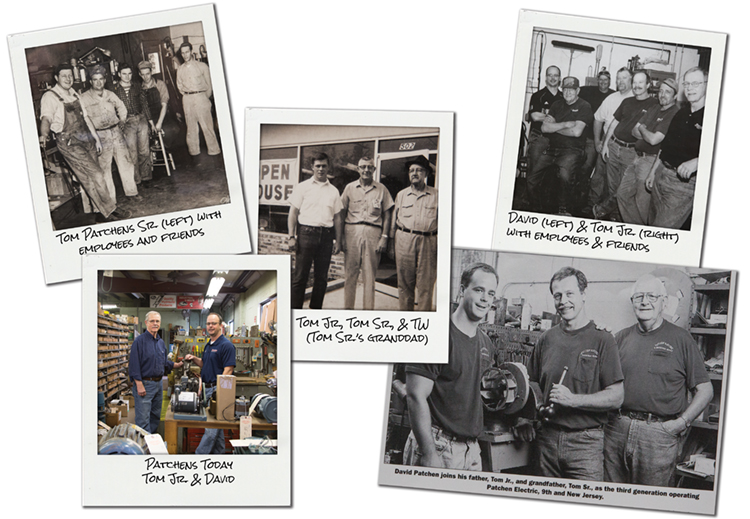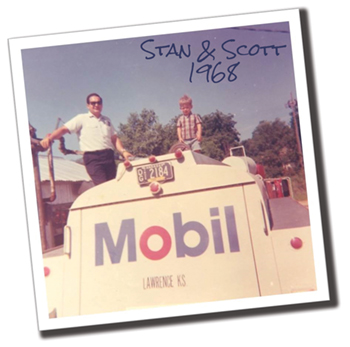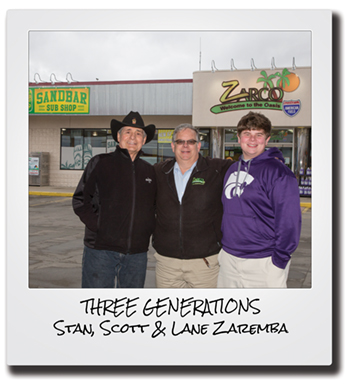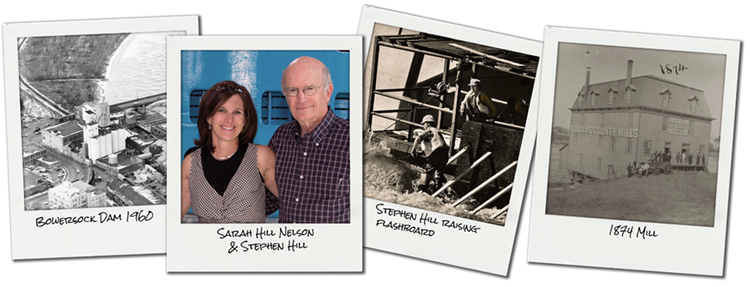ELECTRIC – OIL – HYDRO
| 2017 Q1 | story by Rebeka Luttinger

Typically, hand-me-downs are not that exciting to receive. Granted, there are some things such as a passed-down car that would be hard to say no to, but after all, why would someone want something that already saw its glory days? Well, for three particular business owners in Lawrence, receiving the passed-down family business was nothing at all like receiving worn out hand-me-downs.
Patchen Electric and Industrial Supply Inc.
Patchen Electric and Industrial Supply Inc. has been around since 1948, when Tom Patchen Sr. had a dollar and a dream. Since then, the company has been passed down to Tom Patchen Jr., who works tirelessly alongside his son, David Patchen, to keep the success alive. Working mainly in the industrial supply world, this third-generation business sells and repairs electric motors and pumps. These repairs include everything from simply replacing bearings or seals to completely rewinding motors, if needed. For example, Patchen fixes industrial equipment for local farmers, mend heating and air motors for the University of Kansas and repair the generators for Bowersock Hydropower in Lawrence. Patchen Electric also sells parts from its shop on 9th Street, which they moved into back in 1968.
As they grew up, and especially throughout high school, both David and his dad started putting in hours at Patchen. It was never forced upon them; in fact, both of them really wanted to work for the family business.
“I majored in general studies in college, and I worked at some different places afterwards, but I always kind of knew in the back of my mind that I’d end up at Patchen. It just seemed to be the best fit for me. It’s always exciting since no two days are exactly the same in this business,” David says.
Since Patchen first opened, it has been providing a service to the Lawrence community that no other company offers when it comes to repairing motors and pumps. Because of the unique niche, there are always different types of things that need to be done. And Patchen provides excellent service to its dedicated customers, at least 80% of whom are repeat business.
“We always try to take care of the customer. We deal with a lot of good people: professors, farmers, factory people—all types of folks from the surrounding areas. And we are proud to say that we get along well with everyone.”
Oftentimes, planning for succession in a family business is a difficult challenge. The Family Business Institute is an organization that “assists family-owned businesses in multigenerational planning.” The Institute highlighted a study on its website that showed the likelihood of family-owned businesses getting passed down per generation. The results of the study show that about 30% of family businesses survive into the second generation, 12% make it to the third generation and only about 3% get passed down through four generations or beyond.
Clarice Patchen, wife of Tom Patchen Jr., shares her pride for having a business that has made it to a third generation. But, when talk about the future of Patchen comes up, both Tom Jr. and Clarice agree they hope to continue passing it down, but say, “who knows if the grandkids will be interested, plus, we don’t want to force anything.”
On an individual level, the couple has their health to worry about as they get older; but their son David notes his parents are “much needed” to keep the business going the way it is. Clarice agrees with her son, saying: “Tom is a workaholic and will be taken out of here on a gurney.”
Zarco

Stan Zaremba started the original Zaremba Oil Company back in 1968. Today, Scott Zaremba, Stans’s son, is in charge of the family-owned company. Although Stan is still involved with the business, he likes more of the physical things, such as landscaping.
The Zaremba Oil Company got the name Zarco by taking the “ZAR” from Zaremba, the “O” from Oil and the “CO” from Company. Zaroco Inc. was the wholesale company that sold to power plants, but the name was shortened to Zarco when it started a retail side of the business in 1986.
Scott, a second-generation business owner, was able to look at the company’s growth and understand that the financial success came from the convenient store part of the station, not from the gas itself. Without recognizing this, Zarco could’ve failed, and there wouldn’t be the business that stands today. When Scott took over his father’s role, he put some serious thought and planning into the future of the company.
“It is looking at the vision and being able to determine what the next version of business is going to look like. As we evolve, it’s always the same business, we are just evolving to match the consumer need,” Scott says.
Over the last 40 years, business has grown drastically, Scott explains. Besides changing from full-service gas stations to self-service gas stations, Scott recently launched the next big gas station trend, SIRIS. This touch-screen display, located right on the fuel dispenser, is used to order products from both inside the gas station and from places in the surrounding area.
Currently, there are three Zarco gas stations in operation, but soon, there will only be two as Scott focuses on changing the scope of the business.
However, through all of these changes, one thing has remained the same: putting the needs of the customers comes first.

“Our customers are the best because they are local and loyal. You can’t do any better,” Scott says.
Scott remembers being inside the business “as soon as we could walk,” he says.
It is obviously important for the next generation to get involved as early as possible so they have time to learn the ropes. On the other hand, by getting involved so early, it gives the next generation a chance to determine if they even want to run the business full-time once they’re older.
Scott attended Kansas State University and discovered what the outside world was like. Since he had always worked for his parents, it was eye-opening to see how the rest of the world operated. Although he encourages anyone to do that, he ultimately decided to work for his dad.
Since starting after college, Scott has realized that “being the second-generation in a family business requires a great deal of patience and compromise.”
In 2012, Zarco became the first gas station to sell E15 fuel. E15 fuel is 15 percent ethanol and is a big deal not only because it is better for the environment, it also gives a second alternative to transportation energy.
Like Scott says, “You can’t be a strong country unless you have strong energy.”
Among other firsts, Zarco was one of the first gas stations to have card readers in the Midwest, and it operated the first fuel bank of Kansas. Originally, customers would line up at the central card reader, located in the middle of the property, to swipe their card. Now, each pump has its own card reader. The fuel bank gave the consumer the option to buy between 100 to 10,000 gallons of gas. The gas would be credited on your card, and it could be used when needed.
Scott is very happy with the company’s growth, as well as with the community in which his company thrives.
“Lawrence is the best place to have a business because it is a tight-knit community but also a community with boundless energy that encompasses all walks of life, which enables us to have a unique perspective,” Scott says proudly.
The succession of Zarco was something Stan Zaremba had to worry about, and now Scott is having similar thoughts as he thinks about his children.
Scott knows the best part about a family business is there is always someone to rely on for the truth, but he also knows that when working with relatives, the bar is set so much higher, which is burdening.
“Sometimes you just have to be realistic. I always make sure my expectations for my kids are realistic. The biggest pressure I have is the pressure I put on myself to make sure my parents are proud of what I do. In this aspect, I can relate to how my children feel,” he says.
Since the company’s focus right now is on the success of both the convenient stores and the SIRIS touch-screen display, the future is in Lawrence. Scott’s children both have interest in working for the company, but they have to see where life takes them. In the meantime, since a lot of big-name competitors have come to town, Zarco will concentrate on retaining its success while thinking about the next move.

Bowersock Hydropower
Bowersock Hydropower produces clean, renewable energy for Kansans. Its dam, located near South Powerhouse Road in the Kansas River, borrows the weight of the water to create clean electricity. And, it is the only operating hydroelectric plant in Kansas.
As a unique company, it is not surprising it has quite the history, as well. Stephen Hill, CEO of Bowersock up until 2013, had a smart great-grandfather, James Gower. Gower recognized the Kansas River had very rich soil and was a promising agricultural area, so he bought the land. Not only did he have his family’s future in mind when he purchased this land, he also had an emotional connection to the land since his family used to own it. From its inception in 1874, Bowersock was involved in many things before it found its utmost success in the waterpower industry.
Sarah Hill-Nelson, CEO of Bowersock Hydropower, has a lot of pride in her family business. Hill-Nelson is just one of three women in the U.S. who is a chief executive officer of a hydropower company.
Although not in charge anymore, former CEO Stephen Hill has stayed very involved in the company and loves working with his daughter Sarah. The two of them spend hours bouncing different ideas around, which creates healthy competition and shows just how collaborative they can be.
“We’ve only ever had one conflict,” Sarah says, “and we decided to test both options out and let the best one win. That just shows me how lucky I am to have such healthy competition.”
In 2010, Bowersock expanded its operations across the river, and the new building went into operation in 2012, right before Sarah took over. She immediately had a lot of work to do.
“Although the changes in the business have really been about improvement, we’ve had some pretty dramatic changes,” Sarah says.
Along with their success, Nelson-Hill and her dad are thankful to the Lawrence community: “The people are so supportive of us.”
“They will always do what they say they are going to do,” says David Corliss the former Lawrence city manager.
To give back to the Lawrence community, Bowersock spends a lot of time educating students and adults about the river and waterpower. And during the recession, when the new building opened, the company provided about a hundred jobs to locals in construction and engineering. By teaching others, they spread knowledge about creating and utilizing clean electricity.
Right now, Kansas City Board of Public Utilities is Bowersock’s only customer, and it is a relationship that keep evolving.. Being fair and having integrity are values Bowersock stands for and upholds. This has worked out well, as Kansas City Board of Public Utilities has stood by them and pushed them to improve.
“Kansas City Board of Public Utilities has been a great business partner. We could not ask for a better partner to sell our power to,” Sarah says.
The future looks bright for Bowersock, and that future will definitely be in Lawrence—particularly because a dam doesn’t move very far.
With tears in her eyes, Sarah gratefully says, “What a gift it is to work for my dad. Not very many people get an opportunity to work for their parents in this way, and it is so special.”
